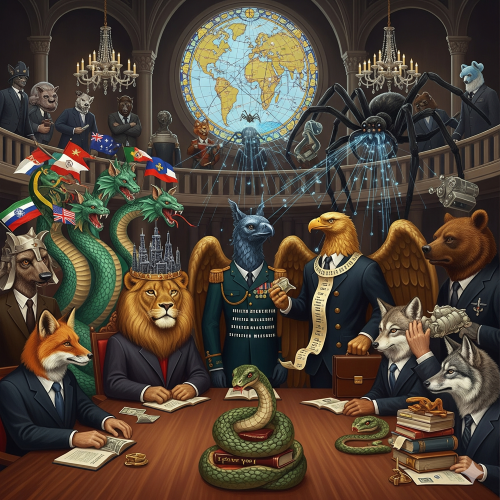Do Australia and New Zealand welcome European involvement, or see it as complicating their regional leadership?

Australia and New Zealand strongly welcome European involvement in the Pacific, viewing it as a strategic asset that reinforces rather than complicates their regional leadership.
While historically they might have preferred a more exclusive sphere of influence, the current geopolitical reality—driven by intensifying great power competition with China—has fundamentally changed their calculus.
They see Europe as a "like-minded" partner that brings critical resources and diplomatic weight to the region, aligning with their core strategic goal: securing a "stable, secure, resilient, and prosperous Blue Pacific."
1. The Strategic Imperative: Burden-Sharing in the Geopolitical Contest
The most significant factor driving Australian and New Zealand support for European engagement is the shared objective of countering China’s growing influence in the region.
-
Mitigating China’s Assertiveness: Australia and New Zealand, as the largest resident regional powers, bear the primary responsibility for the Pacific’s stability. The increased frequency and scope of China’s infrastructure, economic, and security proposals strain their resources and diplomatic capacity. European involvement, particularly through the EU's Global Gateway initiative, acts as a burden-sharing mechanism, providing an alternative source of high-quality, transparent development finance.
-
The "Partners in the Blue Pacific" (PBP): The clearest evidence of this welcome is the formation of the Partners in the Blue Pacific (PBP), an informal coordination mechanism initiated by the US, Australia, New Zealand, Japan, and the UK.1 While the EU is not a founding member, European states like Germany, France, and the Netherlands are central to the PBP’s expanded efforts. Australia and New Zealand actively seek this multilateral coordination to ensure all partners are singing from the same strategic hymn sheet.
-
The Power of Collective Values: By bringing in European partners, Australia and New Zealand amplify the voice of the democratic, values-based approach. The Europeans' emphasis on good governance, climate action, and the rule of law reinforces the core principles that Australia and New Zealand champion, making it harder for authoritarian approaches to gain unchallenged traction.
2. Europe as a Diplomatic and Thematic Force Multiplier
Europe's specific strengths offer unique benefits that complement the existing aid programs of Australia and New Zealand, making their involvement a force multiplier rather than a rival.
| European Strength | Benefit to Australia/New Zealand’s Agenda |
| Climate Change Focus | Neutralizing a Key Friction Point: Climate change is the number one priority for Pacific Island nations but has historically been a major source of diplomatic friction with Australia. The EU's strong, proactive stance on climate finance and the Green Blue Alliance validates the Pacific's priorities, allowing Canberra and Wellington to align better with regional leaders. |
| Ocean and Maritime Expertise | Enhancing Security without Militarization: Europe, with its advanced navies (France being a resident power) and technical agencies, offers crucial support for maritime security, ocean governance, and fighting Illegal, Unreported, and Unregulated (IUU) fishing. This aids the shared security agenda without solely relying on US military-centric solutions, which can make some Pacific nations uneasy. |
| Institutional Depth | Long-Term, Reliable Funding: The EU's long-standing institutional ties via the Samoa Agreement (formerly Cotonou) provide a reliable, predictable source of development aid that is essential for long-term stability—a form of consistency that can be difficult for single-nation bilateral programs to match. |
| Trade Liberalization | Economic Diversification: New Zealand, in particular, has sought and successfully concluded a Free Trade Agreement with the EU, demonstrating a shared interest in strengthening economic ties among democratic nations. While Australia's FTA negotiations have been more complex, the shared goal is to expand economic opportunities that don't depend solely on the massive but strategically challenging Chinese market. |
3. Managing the Complication: Alignment to the "2050 Strategy"
While the welcome is genuine, it comes with a major caveat: all partners must align their efforts with the region's own priorities.
-
The Pacific Islands Forum (PIF) as the Gatekeeper: Australia and New Zealand, as members of the PIF, must adhere to the principle that development must be guided by the Pacific-owned 2050 Strategy for the Blue Pacific Continent. Their role is to ensure European partners, like all external actors, do not bypass the PIF or impose external agendas (such as an overly militarized 'Indo-Pacific' framing) on sovereign nations.
-
Preventing Duplication and "Partner Fatigue": A risk of having too many partners (the US, Japan, UK, France, Germany, the EU, India, etc.) is the duplication of projects and the burden of coordinating with multiple, disparate offers—what Pacific leaders call "partner fatigue." Australia and New Zealand's role is to use multilateral frameworks like the PBP and their influence within the PIF to ensure the European offers are streamlined, coordinated, and complementary to existing regional programs, thereby maximizing their collective impact.
In conclusion, Australia and New Zealand see Europe's involvement as an essential strategic diversification and resource injection that helps them manage the complex geopolitical environment. Rather than a challenge to their regional leadership, it is an indispensable buttress that strengthens the democratic camp, validates Pacific priorities, and enhances the region's resilience against destabilizing external pressures.
- Questions and Answers
- Opinion
- Motivational and Inspiring Story
- Technology
- Live and Let live
- Focus
- Geopolitics
- Military-Arms/Equipment
- Безопасность
- Economy
- Beasts of Nations
- Machine Tools-The “Mother Industry”
- Art
- Causes
- Crafts
- Dance
- Drinks
- Film/Movie
- Fitness
- Food
- Игры
- Gardening
- Health
- Главная
- Literature
- Music
- Networking
- Другое
- Party
- Religion
- Shopping
- Sports
- Theater
- Health and Wellness
- News
- Culture

